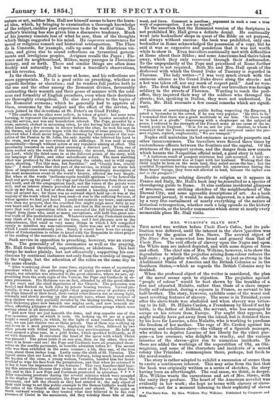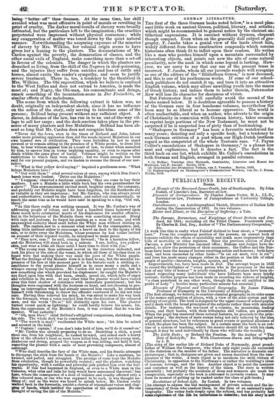HES. WILXINS'S SLAVE SON. * THIS novel was written before Uncle
Tom's Cabin, but its pub- lication was deferred, until the interest in the slave ',question was revived by the genius of Mrs. Stowe. The avowed object of- The Slave Son is somewhat less broad and general than that of ' Uncle Tom. The evil effects of slavery upon the Negro and upon , the White man are indeed depicted, and with some degree of force and effect. The chief aim of Mrs. Wilkins, however, is to show the degradation to which the prejudice arising from colour reduces the half-caste ; a prejudice which, she affirms, is just as strong in the Abolitionist States of America and the BriUsh Colonies as in the Southern States,—which as regards the British Colonies may be doubted.
When the professed object of the writer is considered, the plan of the novel seems open to objection. The prejudice against "people of colour" would be best shown by the troubles of a free and educated Mulatto, rather than those of a slave imper- fectly self-educated, during a sojourn in France, as servant to his half-brother. The story, however, exhibits some of the worst and most revolting features of slavery. The scene is in Trinidad, years after the slave-trade was abolished and when slavery was totter- ing to its fall. St. Hilaire Carden, a Frenchman by blood if not by birth, is the father of Belfond, the servant, who has managed to escape on his return from, Europe. For aught that appears, he might readily have got away from the island, but is detained there by his love for Laurine, a free Mulatto, who is working to purchase the freedom of her mother. The rage of Mr. Cardon against his runaway and rebellious slave—the villany of a Spanish manager, who wishes to deprive Laurine of her liberty for the vilest pur- pose—a low overseer, who delights in cruelty, and the various miseries of the slaves—give rise to numerous incidents. To these are added the workings of the superstition of Obi, an Obi- magician, and some of the characters and incidents of a mixed colony like Trinidad ; commonplace there, perhaps, but fresh to the novel-reader.
The story is rather adapted to exhibit a succession of scenes than to excite a continuous interest. This may arise from the fact that the book was originally written as a series of sketches, the story having been an afterthought. The real cause, we think, is deeper. Mrs. Wilkins wants the earnestness and art of Mrs. StAwe, with the unity they produce. The heart of the American novelist was evidently in her work ; she kept no terms with slavery or slave- owners,—not for a moment listening to their sophistry of slaves
• The Slave Son. By Mrs. William Noy Wilkins. Published by Chapman and Hall.
being- "hetter.off" than freemen. At the same time, her skill' avoided what was most offensive in point of morals or revolting in point of cruelty. The darker moral results of slavery were broadly intimated, but the particulars left to the imagination; the cruelties perpetrated were impressed without physical coarseness ; while any exaggeration of matter was toned down by the quiet natural manner. Notwithstanding the unsparing exposure of the miseries of slavery by Mrs. Wilkins, her colonial origin seems to have ven her a leaning to the planters. The denunciations of Mr. on against the poverty, the demarcation of classes, and the other social evils of England, make something more than a set-off in favour of the colonists. The danger in which the planters are described as living, from the skill of the Negroes in slow-poisoning, and the injuries they suffer from suicides and loss of cattle and horses, ahnost excite the reader's sympathy, and seem to justify severe treatment. There is, too, a tendency to the theatrical in Mrs. Wilkins. The Obi superstition, which we believe is confined to the West Indies and does not extend to America, is made the most of; and Nanty, the Obi-man, his concomitants and doings, smack something of the incantation-scene in Der Freischiitz, or similar effects of the melodrama.
The scene from which the following extract is taken was, no doubt, originally an independent sketch, since it has no influence on the action of the story, only serving to introduce some of the persons; Belfond being present without any sufficient object. A slaver, in defiance of the law, has run in to an out-of-the-way vil- lage to sell her cargo ; and the deck-auction takes place in the pre- sence of many planters and free Mulattoes. Belfond has been ab- sent so long that Mr. Carden does not recognize him.
"Never did the Jews, even in the times of Richard and John, labour under more grinding oppression than did the much-injured Mulattoes in our own boasted sera of civilization. They were forbidden by law to stand covered or to remain sitting in the presence of a White person, to dress like him, to bear witness against him in a court of law, to resist when assaulted by him, to answer him in terms implying equality, or even to repose after death within the same place of buriaL. Volumes might be written on the restrictions to which they were subject ; but we think enough has been said for our present purpose, and we hasten to resume the thread of our nar- rative.
" What is that yellow devil saying ? ' inquired a gentleman near. 'What brings Mulattoes here ? ' " Out with them!' cried several voices at once, among which Don Duro's harsh tones were loudest. Drive out the Mulattoes !'
" '1 suppose, observed a facetious customer, 'they are come to buy their mothers. I saw a Mulatto a little while back buy his own grandmother for a slave!' This announcement excited much laughter among the company, and probably our Mulatto might have been forgotten, for the Southerns are as variable as they are impetuous ; but Mr. Cardon, who was always proud and authoritative, turned on the offender, and called out domineeringly, in much the same tone as he would have used in speaking to a dog, Get out, there!'
"In this there really was nothing unusual It was Mr. Cordon's way of addressing people of colour, and he had a hundred times bestowed upon them much more substantial marks of his displeasure for smaller offences; but in the behaviour of the Mulatto there was something unusual. Stung with rage and jealousy, he forgot his position as a man of caste, and with unexampled audacity stood erect before the White man without stirring an inch. The captain saw in a moment what would be the consequence, and, being little inclined either to encourage a brawl on deck to the injury of his sale, or to drive away the Mulattoes, whose presence he had rather invited on account of their reputed wealth, he interposed to make peace. "'Easy now, easy !' he said, coming forward ; he is a harmless fellow, , and the Mulattoes will stand back in a minute. I say, holloa, you yellow- 'list wear a little aft there until I have time to treat with you.' e young man thus addressed moved in the direction indicated, and took his place at the side of the vessel, to which all those of his class then on board were fast making their way amid thejeers of the White people. What the feelings of the Mulatto were it is hard to say, but the scornful ex- pression of his face at this moment gave to his features such a striking re- semblance to the proud planter himself as to cause many a smile and a whisper among the bystanders. Mr. Carden did not perceive this, but he saw something else which provoked his displeasure; he caught the Mulatto's eye fixed upon him with that keen, steady, proud air, which tells of anger and rebellion in the soul. At any other time the planter would have visited even this faint shadow of resistance with immediate punishment ; but his thoughts were engrossed with the business on hand, and not choosing to pro- long an interruption which had already annoyed him enough, he contented himself with threatening to throw the offender overboard if he did not take care. Having thus relieved his mind, he was about to make his way back to the foremast, when a voice reached him from the direction of the coloured man, and the words 'Do so!' fell distinctly upon his ears. The planter turned round quick as lightning : he could hardly believe his senses, for, from the expression of the Mulatto's face, it was evident that he w® the speaker. What audacity ! " Oh, mon Dieu! ' cried Belfond'a affrighted companions, shrinking from his side. The whole deck was in commotion.
"'The wretch is mad !' vociferated the White men ; let him be seized and secured in the hold.'
"'Captain ! captain ! if yon don't take hold of him, we'll do it ourself es.'
"Mr. Cardon was already preparing to do so. Snatching a stick, a good stout one, from his neighbour, he rushed forward, and aimed such a heavy blow at the offender's head as must have killed him, had not the young man, dexterous and strong, grasped the weapon as it was falling, and .held it fast, regarding the planter with a smile of most provoking composure, almost of contempt. "Who shall describe the fury of the White man, and his frantic attempts to disengage the stick from the hands of the Mulatto? Like a madman, he twisted, and pulled, and struggled. The prestige of caste kept the Mulatto from retaliation, though he powerfully resisted ; and the planter, watching his opportunity, with a sudden and powerful jerk pitched him over the bul- warks. If this had happened in England, or even to a White man in the Colonies, what cries and calls for help would have announced theevent ! but here, where the consequence of a deed of violence and cruelty affected only a five coloured man, or one who was supposed to be such it was thought no- thing of ; and as the water was heard to splash below, Mr. Carden coolly walked back to the forecastle, amidst a chorus of triumphant voices and clap- ping of hands, which testified the approbation of the. spectators. No one thought of saving the life of the Mulatto."



























 Previous page
Previous page